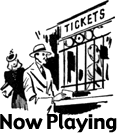
![]()

|
This week: |
Filthy says: |
| When
I do something I know is wrong, the guilt feels like little needles
stuck in my brain. I can try to ignore them and just go about
my business or I can flinch in shame at the pain. Over time, I
might get used to the needles, or sensory fatigue may let me forget
they're there. But then things happen that occasionally jam some
a little deeper.
When I do something I don't know is wrong, but someone points out to me that it was, I don't feel guilty. I just get really pissed at the person who points it out and blame them for my troubles. Fucking assholes. When I worked at the Family Dollar, I once stole a Sprinkles the Shower Clown. Immediately, I felt awful for doing it, but then every time I saw his silly face spitting on me when I bathed, a little more scar tissue grew over the guilt needle. How crummy can you feel when you're giggling AND getting clean at the same time? The needle is still there, though, and it occasionally jabs me, like when I see on the TV those kids with the bloated bellies, covered with flies, and I think, "Those kids need Sprinkles more than I do." That's why you don't want to go through life as an asshole: because those needles never go away. When I'm an old man, I don't want to have so many of them in my skull that everything I do creates searing, shameful pain. Or maybe you do want to go through life being an asshole. Some people never feel guilt and shame, so they do what they think they can get away with. Who's better off in the long run: the guy who gets away with a crime and forever feels shitty about it, or one who gets away with it and feels nothing? Woody Allen spends a lot of time thinking about guilt and shame, in a very Dostoevsky way. Probably more than me, and I have a huge stash of stolen German pornography and shameful drunken experiences that I should apologize for. Really, stealing the porn doesn't shame me. It's how fucking bad it is, and that I keep watching it that plants more and more needles in my skull. Allen addressed guilt as self-imposed punishment in Crimes and Misdemeanors, which was pretty good. In that movie a man has his mistress killed. He gets away with it and rather than shame, he feels relief. Meanwhile, other people doing far less horrible things suffer because they have consciences. Allen basically revisits the same theme in Match Point. Only, this time he doesn't pretend to be funny. That's okay with me because his jokes were becoming the pretty damn stale gags of an old man. I say that as someone who can sit through seven ventriloquists at the Elks Lodge Open Mic Night because they give us free beer. Match Point is the story of a former tennis pro (Jonathan Rhys-Meyer) who marries into money, gives up tennis and grows very accustomed to his new family's wealth. He loves his wife (Emily Mortimer), but he lusts after Scarlett Johannson, a failed actress with low self-esteem but loads of sex appeal. While his wife is focused on conceiving a baby, Meyer is out pounding the pony with Johannson and accidentally knocking her up. Johannson wants Meyer to leave his wife, but the fucking coward has gotten so used to luxury that he isn't eager to going back to being poor. Besides, once she's pregnant, she's nowhere near as appealing to him. So he kills her, staging it like a robbery, and ultimately getting away with it. What's most surprising about this movie is how unoriginal the premise is. First, Allen is ripping himself off. Second, he's ripping off Fatal Attraction and its many shittier imitators. The basic premise here is the same as in every story of the doomed affair and the "difficult decision." The only difference is that Allen directly references Dostoevsky in the movie and that he speaks of the role of luck and fate in deciding who gets punished and who doesn't. In short, some bastards are lucky and get away, others are unlucky and don't. Still others are honest, and don't. So, it's best to be a lucky, spineless bastard, I guess. Sort of interesting premise, but not when tied onto the back of a tepid, recycled drama full of stifled characters. And it would be even better if Allen hadn't already told us this once, and if it didn't sound so much like he's pouting about it. The movie takes place in upper-crusty London, which gives the characters a formalized blandness. They all speak within a limited range of personality and emotion, and all have similar senses of wit. They're fucking dullards. Johannson is different as the only American, but she's given a role that devolves quickly from confident lush to whiny, clingy screecher. If I wanted that I would spend more time with Mrs. Filthy's sisters. Her dilemma, being pregnant with a married man's child, is supposed to make her sympathetic. But she's the whininess overwhelms any sympathy we have. Rhys-Meyer may be under sedation. It's hard to tell. The character's soullessness is shown through a lack of emotion, which is perhaps the most boring way to show it to us. The movie looks all warm and overcast, like I imagine London is in the summer. But Allen has no real idea of what he wants to show us, so it ends up being as hackneyed a postcard view as Eurotrip. There's the Thames, there's the Bridge, there's Buckingham Palace. On and on. Overall, Match Point is a failed experiment. Like the time I tried gluing glitter onto rats and selling them as exotic pets. Good idea, but somebody else got there first. And that guy selling the gold-star mice here in Arvada is making buttloads of cash. Two Fingers for Match Point. I admire Allen for realizing he's not funny anymore, but I worry that he's not even original when he's dull. |
 |
|
Jeffrey Lyons of NBC's Reel Talk Last Holiday is "an elegant, dizzying romantic comedy!" Hoodwinked is "Superb! a superb performance by Queen Latifah!" Tristan and Isolde is "A deeply moving version of one of the most legendary love stories of them all!" Casanova is "The funniest, most enjoyable romantic comedy since Shaekspeare in Love." |
 Filthy's Reading Tom Perrotta - Little Children Listening to The Feelies - The Good Earth Watching Y Tu Mama Tambien  |



